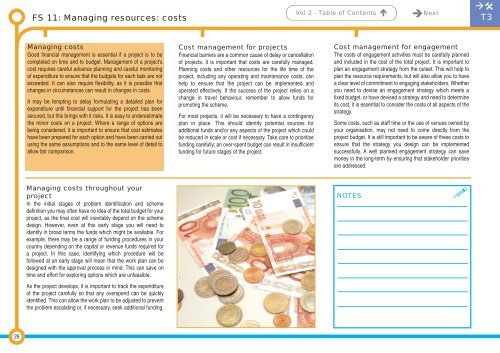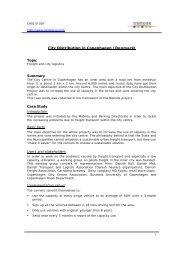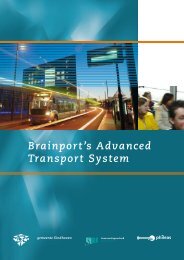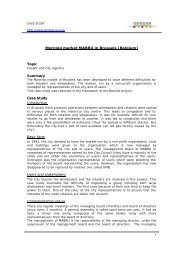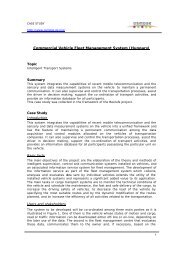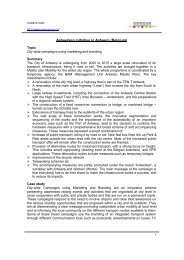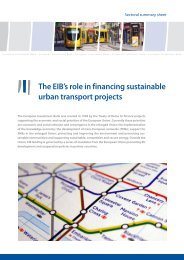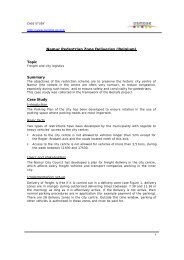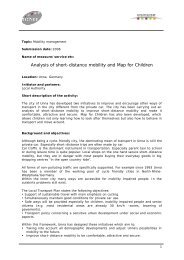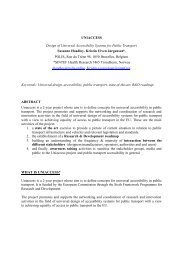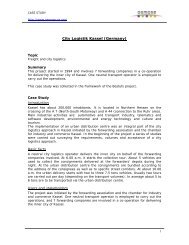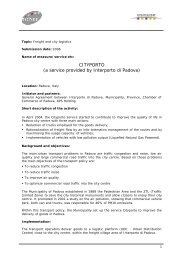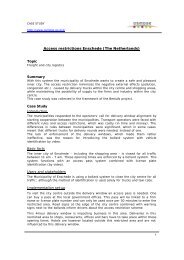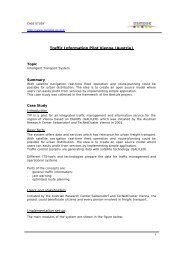Successful transport decision-making - Osmose
Successful transport decision-making - Osmose
Successful transport decision-making - Osmose
Create successful ePaper yourself
Turn your PDF publications into a flip-book with our unique Google optimized e-Paper software.
FS 11: Managing resources: costs<br />
Vol 2 - Table of Contents <br />
Next<br />
<br />
T3<br />
Managing costs<br />
Good financial management is essential if a project is to be<br />
completed on time and to budget. Management of a project's<br />
cost requires careful advance planning and careful monitoring<br />
of expenditure to ensure that the budgets for each task are not<br />
exceeded. It can also require flexibility, as it is possible that<br />
changes in circumstances can result in changes in costs.<br />
It may be tempting to delay formulating a detailed plan for<br />
expenditure until financial support for the project has been<br />
secured, but this brings with it risks. It is easy to underestimate<br />
the minor costs on a project. Where a range of options are<br />
being considered, it is important to ensure that cost estimates<br />
have been prepared for each option and have been carried out<br />
using the same assumptions and to the same level of detail to<br />
allow fair comparison.<br />
Cost management for projects<br />
Financial barriers are a common cause of delay or cancellation<br />
of projects. It is important that costs are carefully managed.<br />
Planning costs and other resources for the life time of the<br />
project, including any operating and maintenance costs, can<br />
help to ensure that the project can be implemented and<br />
operated effectively. If the success of the project relies on a<br />
change in travel behaviour, remember to allow funds for<br />
promoting the scheme.<br />
For most projects, it will be necessary to have a contingency<br />
plan in place. This should identify potential sources for<br />
additional funds and/or any aspects of the project which could<br />
be reduced in scale or cost if necessary. Take care to prioritise<br />
funding carefully; an over-spent budget can result in insufficient<br />
funding for future stages of the project.<br />
Cost management for engagement<br />
The costs of engagement activities must be carefully planned<br />
and included in the cost of the total project. It is important to<br />
plan an engagement strategy from the outset. This will help to<br />
plan the resource requirements, but will also allow you to have<br />
a clear level of commitment to engaging stakeholders. Whether<br />
you need to devise an engagement strategy which meets a<br />
fixed budget, or have devised a strategy and need to determine<br />
its cost, it is essential to consider the costs of all aspects of the<br />
strategy.<br />
Some costs, such as staff time or the use of venues owned by<br />
your organisation, may not need to come directly from the<br />
project budget. It is still important to be aware of these costs to<br />
ensure that the strategy you design can be implemented<br />
successfully. A well planned engagement strategy can save<br />
money in the long-term by ensuring that stakeholder priorities<br />
are addressed.<br />
Managing costs throughout your<br />
project<br />
In the initial stages of problem identification and scheme<br />
definition you may often have no idea of the total budget for your<br />
project, as the final cost will inevitably depend on the scheme<br />
design. However, even at this early stage you will need to<br />
identify in broad terms the funds which might be available. For<br />
example, there may be a range of funding procedures in your<br />
country depending on the capital or revenue funds required for<br />
a project. In this case, identifying which procedure will be<br />
followed at an early stage will mean that the work plan can be<br />
designed with the approval process in mind. This can save on<br />
time and effort for exploring options which are unfeasible.<br />
As the project develops, it is important to track the expenditure<br />
of the project carefully so that any overspend can be quickly<br />
identified. This can allow the work plan to be adjusted to prevent<br />
the problem escalating or, if necessary, seek additional funding.<br />
NOTES<br />
<br />
26


